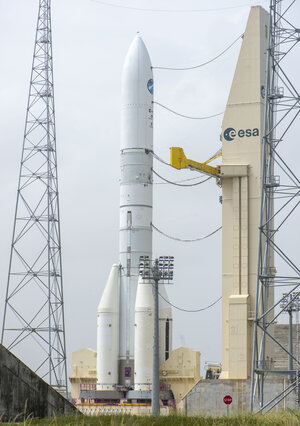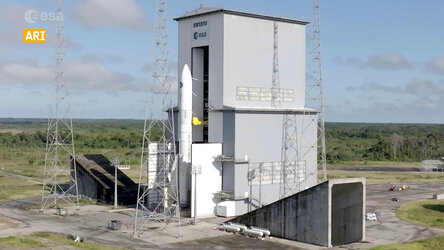Accept all cookies Accept only essential cookies See our Cookie Notice

About ESA
The European Space Agency (ESA) is Europe’s gateway to space. Its mission is to shape the development of Europe’s space capability and ensure that investment in space continues to deliver benefits to the citizens of Europe and the world.
Highlights
ESA - United space in Europe
This is ESA ESA facts Member States & Cooperating States Funding Director General Top management For Member State Delegations European vision European Space Policy ESA & EU Space Councils Responsibility & Sustainability Annual Report Calendar of meetings Corporate newsEstablishments & sites
ESA Headquarters ESA ESTEC ESA ESOC ESA ESRIN ESA EAC ESA ESAC Europe's Spaceport ESA ESEC ESA ECSAT Brussels Office Washington OfficeWorking with ESA
Business with ESA ESA Commercialisation Gateway Law at ESA Careers Cyber resilience at ESA IT at ESA Newsroom Partnerships Merchandising Licence Education Open Space Innovation Platform Integrity and Reporting Administrative Tribunal Health and SafetyMore about ESA
History ESA Historical Archives Exhibitions Publications Art & Culture ESA Merchandise Kids Diversity ESA Brand Centre ESA ChampionsLatest
Space in Member States
Find out more about space activities in our 23 Member States, and understand how ESA works together with their national agencies, institutions and organisations.
Science & Exploration
Exploring our Solar System and unlocking the secrets of the Universe
Go to topicAstronauts
Missions
Juice Euclid Webb Solar Orbiter BepiColombo Gaia ExoMars Cheops Exoplanet missions More missionsActivities
International Space Station Orion service module Gateway Concordia Caves & Pangaea BenefitsLatest
Space Safety
Protecting life and infrastructure on Earth and in orbit
Go to topicAsteroids
Asteroids and Planetary Defence Asteroid danger explained Flyeye telescope: asteroid detection Hera mission: asteroid deflection Near-Earth Object Coordination CentreSpace junk
About space debris Space debris by the numbers Space Environment Report In space refuelling, refurbishing and removingSafety from space
Clean Space ecodesign Zero Debris Technologies Space for Earth Supporting Sustainable DevelopmentApplications
Using space to benefit citizens and meet future challenges on Earth
Go to topicObserving the Earth
Observing the Earth Future EO Copernicus Meteorology Space for our climate Satellite missionsCommercialisation
ESA Commercialisation Gateway Open Space Innovation Platform Business Incubation ESA Space SolutionsLatest
Enabling & Support
Making space accessible and developing the technologies for the future
Go to topicBuilding missions
Space Engineering and Technology Test centre Laboratories Concurrent Design Facility Preparing for the future Shaping the Future Discovery and Preparation Advanced Concepts TeamSpace transportation
Space Transportation Ariane Vega Space Rider Future space transportation Boost! Europe's Spaceport Launches from Europe's Spaceport from 2012Latest
Ariane 6 cryo-arms mimic liftoff
Thank you for liking
You have already liked this page, you can only like it once!
Europe’s Spaceport in French Guiana is preparing for the arrival of Ariane 6, ESA’s new heavy-lift rocket. The latest round of testing aims to validate the system of fuel lines and mechanical supporting arms that will keep Ariane 6 topped up with liquid hydrogen and liquid oxygen in the critical moments before liftoff. This work is part of the final preparations of the new Ariane 6 launch complex and all the systems necessary for a launch.
With the mobile gantry fully retracted – as for a launch – two articulated arms attached to the upper part of the Ariane 6 mast on the launch pad were separated and retracted while filled with hydrogen that is cooled to its liquid state at cryogenic temperatures. This manoeuvre mimics the seconds before liftoff.
The ‘cryo-arms’ are part of the fluidic connection system which connects to Ariane 6 in the final countdown to launch. They support the upper umbilicals which supply cryogenic top-up fuel, maintain the correct pressurisation of the tanks, cool the engines before ignition and generally keep the upper stage in an optimal condition right up to the point of liftoff. The same umbilicals allow the fuel to be drained safely if a launch is aborted.
Each arm is 13 m long and weighs 20 tonnes. One arm supplies liquid hydrogen at -250°C, the other supplies liquid oxygen at -180°C. When Ariane 6 lifts off, these arms will disconnect from the rocket and then pivot away quickly, in just 2.6 seconds, to avoid interfering with the rocket's ascent.
This manoeuvre requires great precision. Almost simultaneously it is necessary to disconnect the arms, protect the supply hoses from gas ejections from the boosters and allow the launch vehicle to pass while avoiding any contact with it.
A 50-tonne counterweight inside the mast speeds up the retraction of the arms. A smart damping system allows the arms to brake before the end of their swing backwards in order to protect the mechanical links with the mast.
Keeping the fluid supplies connected with the rocket until the moment of liftoff guarantees the best availability and simplification of the interface with the launch vehicle.
The disconnection of the cryo-arms from Ariane 6 is much faster than it is from Ariane 5, where the manoeuvre comes six seconds before liftoff. This means the sequence for Ariane 6 can be triggered at the latest possible moment in the countdown, reducing the chance of unnecessary disconnects in the event of an aborted launch.
Technical qualification tests are continuing. The objective now is to complete the qualification process of the hydrogen and oxygen filling lines and launcher interfaces for the lower, core stage.
Further information:
-
CREDIT
ESA/CNES/Arianespace -
LICENCE
ESA Standard Licence
-
Closed captions available Captions and subtitles are available (automatically generated by YouTube) - select your language using the YouTube player controls. A non-YouTube version is available using the 'download' button above.
-
Interior Shot
-
-
-
-

Ariane 6 mast gains cryogenic arms

Early combined tests mimic Ariane 6 liftoff

Counter weight helps to retract cryo-arms

Ariane 6 test model during fuel line disconnection test















 Germany
Germany
 Austria
Austria
 Belgium
Belgium
 Denmark
Denmark
 Spain
Spain
 Estonia
Estonia
 Finland
Finland
 France
France
 Greece
Greece
 Hungary
Hungary
 Ireland
Ireland
 Italy
Italy
 Luxembourg
Luxembourg
 Norway
Norway
 The Netherlands
The Netherlands
 Poland
Poland
 Portugal
Portugal
 Czechia
Czechia
 Romania
Romania
 United Kingdom
United Kingdom
 Slovenia
Slovenia
 Sweden
Sweden
 Switzerland
Switzerland


























